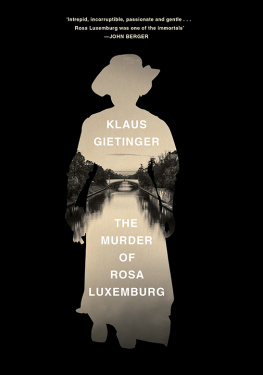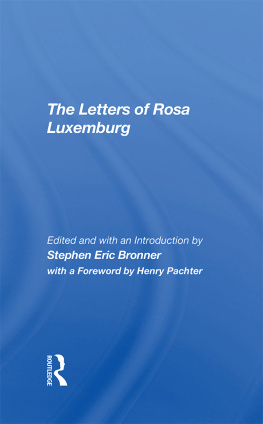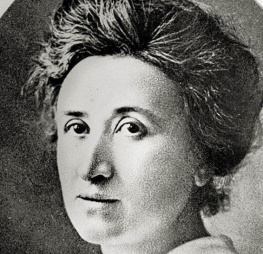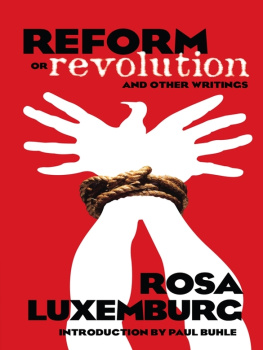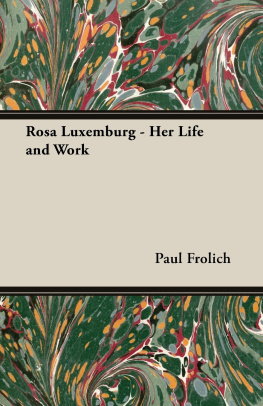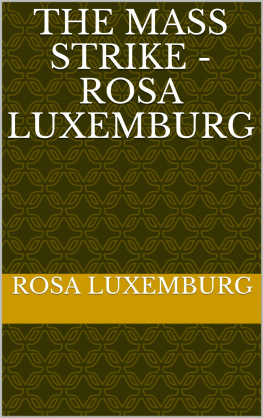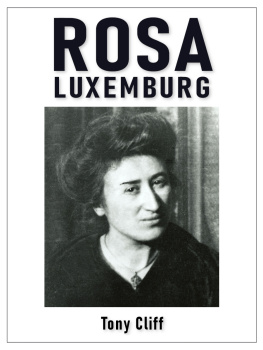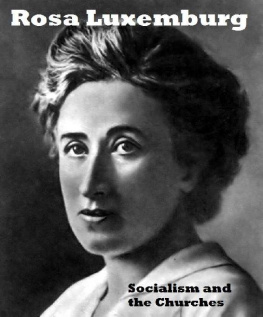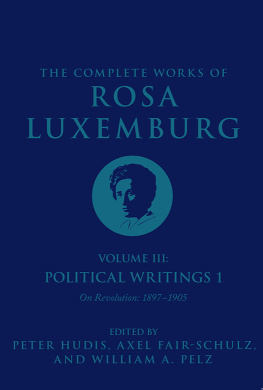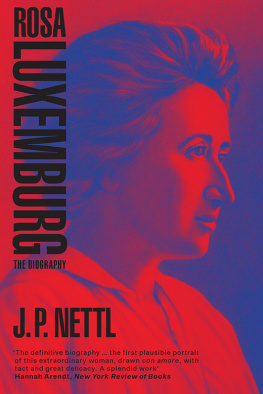Klaus Gietinger - The Murder of Rosa Luxemburg
Here you can read online Klaus Gietinger - The Murder of Rosa Luxemburg full text of the book (entire story) in english for free. Download pdf and epub, get meaning, cover and reviews about this ebook. year: 2019, publisher: Verso, genre: Non-fiction / History. Description of the work, (preface) as well as reviews are available. Best literature library LitArk.com created for fans of good reading and offers a wide selection of genres:
Romance novel
Science fiction
Adventure
Detective
Science
History
Home and family
Prose
Art
Politics
Computer
Non-fiction
Religion
Business
Children
Humor
Choose a favorite category and find really read worthwhile books. Enjoy immersion in the world of imagination, feel the emotions of the characters or learn something new for yourself, make an fascinating discovery.
- Book:The Murder of Rosa Luxemburg
- Author:
- Publisher:Verso
- Genre:
- Year:2019
- Rating:3 / 5
- Favourites:Add to favourites
- Your mark:
- 60
- 1
- 2
- 3
- 4
- 5
The Murder of Rosa Luxemburg: summary, description and annotation
We offer to read an annotation, description, summary or preface (depends on what the author of the book "The Murder of Rosa Luxemburg" wrote himself). If you haven't found the necessary information about the book — write in the comments, we will try to find it.
The Murder of Rosa Luxemburg — read online for free the complete book (whole text) full work
Below is the text of the book, divided by pages. System saving the place of the last page read, allows you to conveniently read the book "The Murder of Rosa Luxemburg" online for free, without having to search again every time where you left off. Put a bookmark, and you can go to the page where you finished reading at any time.
Font size:
Interval:
Bookmark:

Rosa Luxemburg
Rosa Luxemburg
Klaus Gietinger
Translated by Loren Balhorn


The translation of this work was supported by a grant from the Goethe-Institut which is funded by the German Ministry of Foreign Affairs.
First published in English by Verso 2019
Translation Loren Balhorn 2018
First published as Eine Leiche im Landwehrkanal:
Die Ermordung der Rosa Luxemberg
Edition Nautilus, 2008
All rights reserved
The moral rights of the author have been asserted
1 3 5 7 9 10 8 6 4 2
Verso
UK: 6 Meard Street, London W1F 0EG
US: 20 Jay Street, Suite 1010, Brooklyn, NY 11201
versobooks.com
Verso is the imprint of New Left Books
ISBN-13: 978-1-78873-446-2
ISBN-13: 978-1-78873-449-3 (US EBK)
ISBN-13: 978-1-78873-448-6 (UK EBK)
British Library Cataloguing in Publication Data
A catalogue record for this book is available from the British Library
Library of Congress Cataloging-in-Publication Data
A catalog record for this book is available from the Library of Congress
Typeset in Fournier by MJ & N Gavan, Truro, Cornwall
Printed in the UK by CPI Mackays
100 Years of Double Homicide
It was in 1989, just after the Berlin Wall had come down, that I got the crazy idea to make a film about the death of Rosa Luxemburg. Luxemburg was decidedly out at that time the Soviet Union was falling apart, East Germany had disappeared, and all of a sudden no one with any power or authority in reunified Germany was interested in hearing about Rosa Luxemburg: neither the East German dissidents who had turned Luxemburgs line about the freedom of dissenters against their own allegedly socialist state, nor the West German Social Democrats who had regularly invoked her as sword and shield against the single-party dictatorship that ruled the GDR, the Socialist Unity Party. Rosa Luxemburg was suddenly persona non grata in German public life, now viewed primarily as a revolutionary, a woman who advocated revolutionary violence. And in Germany, revolutionary violence is the kind of thing that can get you into trouble it is something one simply does not do, practically the work of the devil.
I failed to raise any money for my film project. Programming directors at the major German television stations advised me to write a family-oriented TV series, or a sitcom instead. But I continued my research in the footsteps of others before me, such as Heinrich Hannover, Elisabeth Hannover-Drck and Dieter Ertel, and before them Leo Jogiches, Paul Levi and many more. I felt sure that someone would take the work eventually.
Then, before finding an interested publisher, I made a quite unexpected discovery: the collected papers of Waldemar Pabst, the man who boasted to the news magazine Der Spiegel in 1962 that he had allowed them to be executed. Housed in the Federal Military Archives in Freiburg, these papers were restricted and thus inaccessible to me. Pabst had not been dead long enough to release them at that point, but someone in the archives must have overlooked this fact, because all of a sudden the relevant files found their way to my desk. I spent weeks sifting through every scrap of paper, uncovering some astonishing information, before turning to other source materials, such as the trial documents from 1919.
The trial for Luxemburgs murder was one of the most laughable travesties of justice in all German history. The murderers comrades-in-arms presided over the court. Ignoring protests (primarily from Social Democracys rank-and-file), the government run by the Social Democratic Party (SPD) allowed the double homicide to be covered up and swept under the carpet before the publics very eyes. They had good reason to do so, as I found in my investigation. But it would seem, according to his papers, that Captain Pabst began to spill the beans in his later years (he only died in 1970).
Reprinted several times since first appearing in Germany in 1993, this book has become a minor bestseller of sorts. It was repeatedly attacked by SPD-aligned historians who claimed that Pabst was senile, or had simply lied. True, Pabst never spoke out publicly but rather among comrades between us, as he put it but that was not what really upset the historians of Social Democracy. Rather, they just could not accept that the things he reported as an eyewitness might be true. What exactly he reported, and more, is laid out in this book.
Ten years ago, the historian with Social Democratic sympathies Hans-Ulrich Wehler had the gall to assert in a radio interview that: Whoever unleashes civil war always lives in the shadow of death. If captured by the other side, he will be put up against the wall Then someone like Noske [the supreme commander of government troops in 1919, a Social Democrat] has to play the bloodhound.
Today, 100 years after the murder of Rosa Luxemburg (and, lest we forget, Karl Liebknecht), the times seem to be changing once again. At the very least, interest in Rosa Luxemburg appears to be enjoying a revival. As time went by I managed to uncover several new pieces of the puzzle that is this lastingly consequential double homicide.
In closing, I would emphasize the extraordinary fact that, even 100 years after Luxemburg and Liebknechts murder, the party responsible has yet to admit its culpability. It is high time it did.
Klaus Gietinger
Saarbrucken, Germany
May 2018
The murders of Rosa Luxemburg and Karl Liebknecht constitutes one of the great tragedies of the twentieth century. No other political assassination in German history stirred public passions and transformed the political climate of the country like that killing on the night of 15 January 1919, in front of a hotel with the paradisiacal name of Eden. Their murders marked the prelude to further political assassinations and a great deal more. As Paul Levi observed, in his famous plea written three years before the victory of German fascism, here began that unearthly train of the dead, which resumed its course in March 1919 and dragged on for years and years murdered and killed.
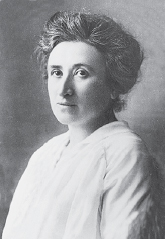
Rosa Luxemburg (18711919);
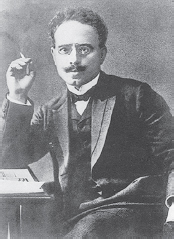
Karl Liebknecht (18711919)
Luxemburg and Liebknechts case epitomized a veritable fall from grace, in which murderers went about their work in full knowledge that the courts would fail.
Although one participants admission of guilt in the 1920s and several trials in the late 1920s and early 1930s would begin to shed some light on the case, these efforts remained hampered by legal wrangling and political setbacks, leading the renowned historian of German Communism, Ossip K. Flechtheim, to conclude resignedly that the precise political, moral and legal responsibility of the various protagonists will most likely never be known.
Yet one of the responsible parties spoke out at first privately in 1959, then publicly in 1962 betraying secrets and sparking furious protests with the shamelessness of his admissions, while at the same time earning the approval of some sectors of society, including the West German government of the time. The final act of this tragic comedy began when the historian Joseph Wulf discovered the GKSD court-martial files, along with additional files of the prosecution dating from 1921 to 1925, and provided them to the West German journalist and filmmaker Dieter Ertel.
Font size:
Interval:
Bookmark:
Similar books «The Murder of Rosa Luxemburg»
Look at similar books to The Murder of Rosa Luxemburg. We have selected literature similar in name and meaning in the hope of providing readers with more options to find new, interesting, not yet read works.
Discussion, reviews of the book The Murder of Rosa Luxemburg and just readers' own opinions. Leave your comments, write what you think about the work, its meaning or the main characters. Specify what exactly you liked and what you didn't like, and why you think so.

